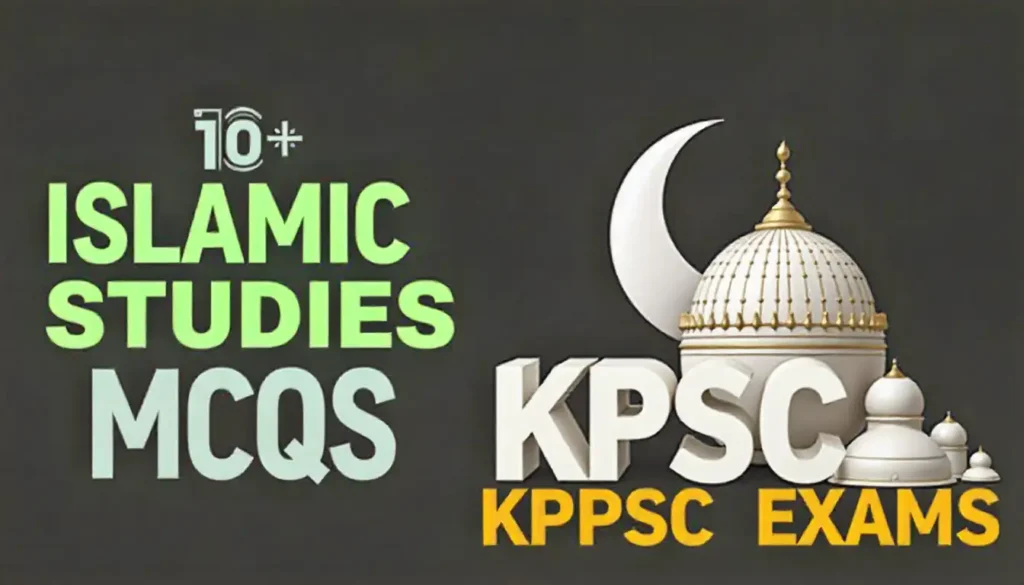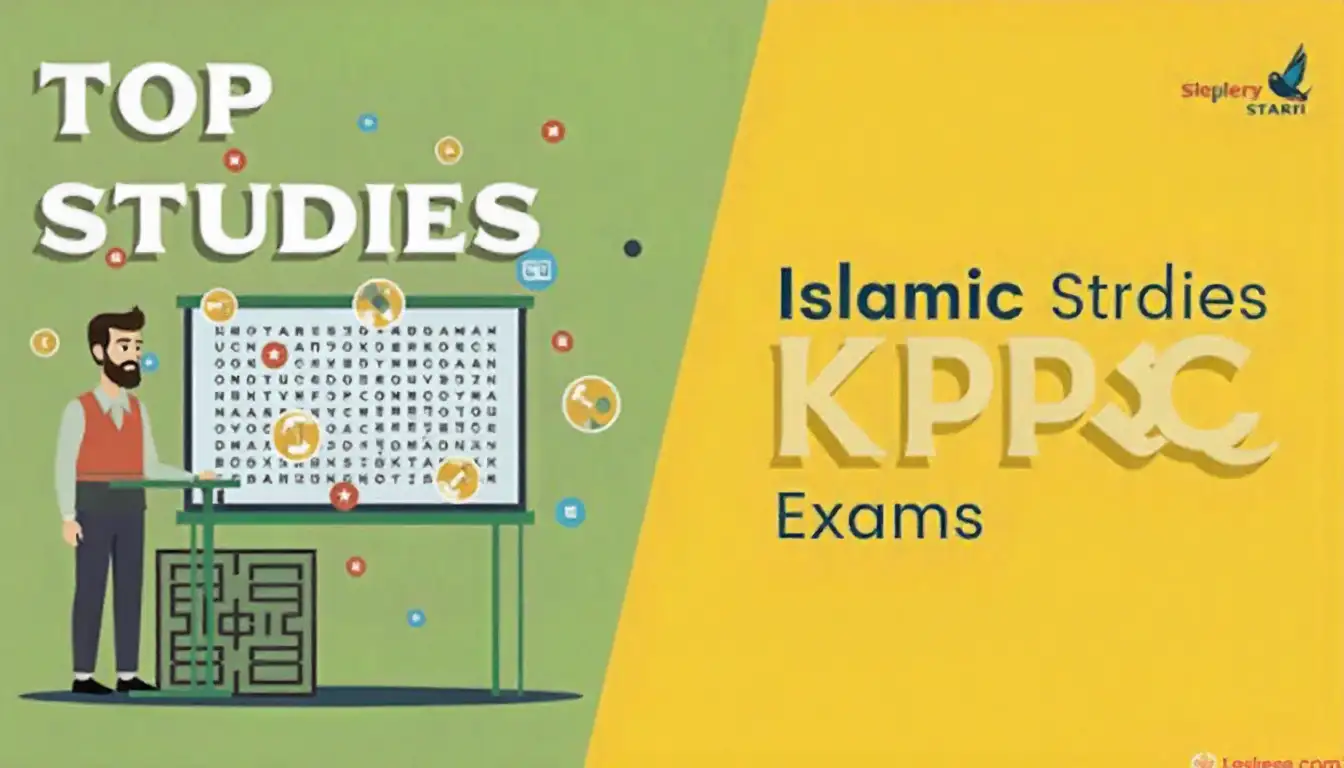🕌 Islamic Studies MCQs That Frequently Appear in KPPSC Exams
In the competitive landscape of government exams in Pakistan, Islamic Studies remains one of the most scoring yet often underestimated subjects. For candidates preparing for KPPSC (Khyber Pakhtunkhwa Public Service Commission) exams—whether for SST posts, Lecturer positions, or BPS-16 roles—mastering Islamic Studies MCQs is not just helpful, it’s essential.
This comprehensive guide will walk you through the most frequently asked MCQs, key topics, preparation strategies, and sample questions to help you ace this section with confidence.
📌 Why Islamic Studies Is Crucial in KPPSC Exams
Islamic Studies is more than just a subject—it reflects the foundational values of Pakistan’s constitution and society. KPPSC includes Islamic Studies to evaluate a candidate’s understanding of:
- Basic Islamic beliefs and practices
- Quranic teachings and Hadith
- Islamic history and jurisprudence
- Ethical and moral principles
- Contributions of Islamic scholars
Whether you’re applying for SST General, Computer Operator, or Lecturer Islamiat, this section can make or break your score.
📚 Frequently Asked Topics in Islamic Studies MCQs

KPPSC exams tend to repeat certain themes and questions. Here’s a breakdown of the most commonly tested areas:
1. Five Pillars of Islam
These are the foundation of Islamic belief and practice:
- Shahadah – Declaration of faith
- Salah – Daily prayers
- Zakat – Almsgiving
- Sawm – Fasting during Ramadan
- Hajj – Pilgrimage to Mecca
Example MCQ: How many times is Salah performed daily? ✅ Answer: Five
2. Important Quranic Surahs and Verses
KPPSC often tests knowledge of the Quran’s structure and key verses:
- First revealed Surah: Al-Alaq
- Longest Surah: Al-Baqarah
- Shortest Surah: Al-Kawthar
- Verse of the Throne: Ayat-ul-Kursi
Example MCQ: Which Surah contains Ayat-ul-Kursi? ✅ Answer: Surah Al-Baqarah
3. Prophets and Their Missions
Understanding the roles of Prophets is essential:
- Total Prophets mentioned in the Quran: 25
- Prophet Musa (AS) and Pharaoh
- Prophet Isa (AS) and the Injil
- Prophet Muhammad (PBUH) as the final messenger
Example MCQ: Who was given the Zabur? ✅ Answer: Prophet Dawood (AS)
4. Hadith & Sunnah
Hadith and Sunnah are key sources of Islamic law:
- Definition of Hadith: Sayings of the Prophet (PBUH)
- Major Hadith books: Sahih Bukhari, Sahih Muslim, Sunan Abu Dawood
- Importance of Sunnah in daily life
Example MCQ: Which book is considered the most authentic Hadith collection? ✅ Answer: Sahih Bukhari
5. Islamic History & Caliphate
Islamic history is a rich source of MCQs:
- Four Rightly Guided Caliphs: Abu Bakr, Umar, Uthman, Ali
- Major battles: Badr, Uhud, Khandaq
- Migration to Medina (Hijrah)
- Treaty of Hudaybiyyah
Example MCQ: Who was the first Caliph of Islam? ✅ Answer: Hazrat Abu Bakr (RA)
6. Fiqh (Islamic Jurisprudence)
Fiqh governs Islamic legal principles:
- Four major schools: Hanafi, Maliki, Shafi’i, Hanbali
- Sources of Islamic law: Quran, Sunnah, Ijma, Qiyas
- Concepts of Halal and Haram
Example MCQ: Which school of thought is most followed in Pakistan? ✅ Answer: Hanafi
7. Islamic Months & Events
KPPSC often tests knowledge of Islamic calendar and events:
- Ramadan, Muharram, Dhul-Hijjah
- Eid-ul-Fitr and Eid-ul-Adha
- Ghazwa-e-Badr, Ghazwa-e-Uhud
Example MCQ: In which month is Hajj performed? ✅ Answer: Dhul-Hijjah
8. Angels and Divine Books
Understanding the roles of angels and revealed scriptures:
- Angel Jibreel (AS) – Revelation
- Angel Israfeel (AS) – Blowing the trumpet
- Angel Malik – Guardian of Hell
- Divine books: Torah, Zabur, Injil, Quran
Example MCQ: Which angel is responsible for bringing revelations? ✅ Answer: Jibreel (AS)
9. Islamic Ethics and Morality
KPPSC may include questions on Islamic values:
- Truthfulness, honesty, patience
- Rights of neighbors, parents, and orphans
- Prohibition of backbiting, lying, and injustice
Example MCQ: Which act is considered a major sin in Islam? ✅ Answer: Backbiting
🧠 How to Prepare for Islamic Studies MCQs
✅ Use Past Papers
Analyzing KPPSC past papers helps identify frequently repeated questions. Focus on:
- SST General past papers
- Lecturer Islamiat papers
- Screening test MCQs
✅ Create Flashcards
Use flashcards for:
- Surah names and meanings
- Prophet stories
- Hadith references
- Islamic terms and definitions
Apps like Quizlet and Anki are great for spaced repetition.
✅ Practice Daily
Consistency is key:
- Solve 20–30 MCQs daily
- Review incorrect answers
- Track your progress weekly
✅ Use Authentic Sources
Recommended books:
- Islamiat by Dogar Publishers
- Caravan Islamiat MCQs
- Sahih Hadith collections
- Tafseer Ibn Kathir (for deeper understanding)
📖 Sample Practice MCQs (With Explanations)
Here are 20 sample MCQs with brief explanations:
- What is the meaning of “Islam”? ✅ Answer: Submission Explanation: Islam means submission to the will of Allah.
- How many Makki Surahs are there in the Quran? ✅ Answer: 86 Explanation: These were revealed before Hijrah.
- Who is known as Khalilullah? ✅ Answer: Prophet Ibrahim (AS) Explanation: Khalilullah means “Friend of Allah”.
- Which angel is responsible for death? ✅ Answer: Azrael (AS)
- Which Surah was revealed completely at once? ✅ Answer: Surah Al-An’am
- Who compiled the Quran in book form? ✅ Answer: Hazrat Abu Bakr (RA)
- Which Caliph introduced the Hijri calendar? ✅ Answer: Hazrat Umar (RA)
- What is the meaning of “Zakat”? ✅ Answer: Purification
- Which battle was fought in Ramadan? ✅ Answer: Battle of Badr
- How many times is the word “Zakat” mentioned in the Quran? ✅ Answer: 32 times
- Which Prophet was swallowed by a fish? ✅ Answer: Prophet Yunus (AS)
- What is the name of the cave where the Quran was first revealed? ✅ Answer: Cave Hira
- Which Surah is called the Heart of the Quran? ✅ Answer: Surah Yaseen
- Who was the first woman to accept Islam? ✅ Answer: Hazrat Khadijah (RA)
- Which Prophet built the Kaaba? ✅ Answer: Prophet Ibrahim (AS) and Prophet Ismail (AS)
- Which Surah has no Bismillah? ✅ Answer: Surah Taubah
- Which Prophet could speak in infancy? ✅ Answer: Prophet Isa (AS)
- Which angel is responsible for blowing the trumpet? ✅ Answer: Israfeel (AS)
- Which Surah is recited most in Salah? ✅ Answer: Surah Al-Fatiha
- Which Prophet was known for his wisdom? ✅ Answer: Prophet Sulaiman (AS)
📢 Final Thoughts
Islamic Studies is a high-scoring section in KPPSC exams—if approached strategically. By focusing on frequently asked MCQs, mastering key topics like the Five Pillars, Quranic Surahs, Prophets, and Islamic history, and practicing consistently, you can significantly boost your chances of success.
Remember, KPPSC doesn’t just test your memory—it evaluates your understanding of Islamic principles that shape our society. So aim for clarity, not just cramming. Use authentic sources, solve past papers, and stay disciplined in your preparation.
At , we’re committed to helping you succeed. Explore our free MCQ banks, past papers, and job alerts to stay ahead of the curve. Whether you’re preparing for SST General, Lecturer Islamiat, or any other KPPSC post, this guide can be your foundation.
Keep learning, keep practicing—and may your efforts lead to a rewarding career in public service.

